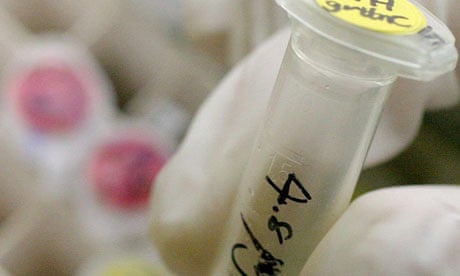What is this vaccine?
Scientists at two Spanish hospitals have identified a vaccine they claim could one day dramatically reduce the effect of HIV on the human body. The vaccine, known as MVA-B, is a variation on the same vaccinia virus that was used to eradicate smallpox in the mid-20th century. The virus, which most immune systems can neutralise easily, was manipulated to carry four HIV genes, then given to 24 healthy individuals to gauge how their immune systems would respond. Around 90% of volunteers on the trial developed an immune response against HIV, while 85% are still showing this response a year since vaccination.
How would it work?
MVA-B is a therapeutic vaccine, which means – if refined to the point where it was totally effective – it would be administered only to those already living with HIV. It would then control the virus in their bodies in much the same way modern antiretroviral treatments do, except people would only need a single injection (or annual jab) rather than a daily regime of tablets. Such a vaccination programme, rolled out globally, would not only improve the health of the millions living with HIV worldwide, it would also have a significant impact in reducing onward HIV transmission.
Is it truly a breakthrough?
Yes, but a small one. Anything that helps us better understand HIV and how it works is certainly good news. However, it's important to remember this was a phase I trial, working with a very small cohort of volunteers (in comparison, a 2009 trial by the US army and Thai government saw an experimental vaccine given to over 8,000 people). HIV is an incredibly complex virus, with many different strains that we are still learning about. This study, which only looked at one strain, really is just one step on a longer journey.
What other treatments are currently being researched?
Therapeutic vaccines are an exciting area of research, but there are still lots of avenues to explore. Right now, in thousands of labs all over the world, a small army of scientists and researchers are looking at different ways we might one day eradicate HIV, just as we have done with other epidemics. Other approaches showing promise include gene therapy and treatment as prevention (offering antiretroviral drugs to people who are HIV-negative but regularly take risks with their sexual health).
How far away from an effective vaccine are we?
The short answer is we don't know. Scientists are making new discoveries all the time; we know that some will be the foundation of an eventual cure, while others will fall by the wayside. For the time being, we all have a responsibility to try and minimise the epidemic's spread. So long as there's no vaccine and no cure, the best way to protect yourself against HIV and other STIs is to use condoms when having sex.
